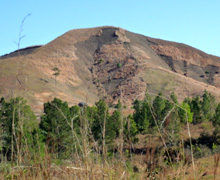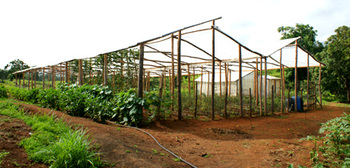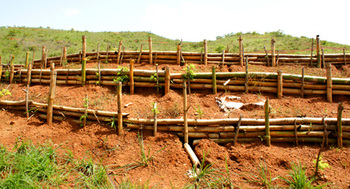Integrated management of transboundary watershed Rio Libón
Project description
Title: Regional programme: Integrated management of transboundary watershed Rio Libón, Dominican Republic and HaitiCommissioned by: German Federal Ministry for Economic Cooperation and Development (BMZ)
Country: Dominican Republic and Haiti
Lead executing agency: Ministry of Planning Haiti and Dominican Republic
Overall term: 2011 to 2015

Context
Woodlands and tree populations are dwindling in the border area between the Dominican Republic and Haiti. Consequently, the degradation of natural ecosystems is increasing while opportunities to earn income from the use of natural resources are decreasing. Worsening poverty among large swaths of the population and the lack of alternative sources of income are putting ever greater pressure on natural resources. Deforestation, erosion and the loss of fertile soils pose an increasing threat to the livelihoods and future prospects for poor population groups living in the transboundary watershed for the Libón River.
The Dominican Republic launched the national reforestation programme Quisqueya Verde in 1997 and initiated the binational programme Frontera Verde (Green Border) with Haiti in 2008. The idea behind Frontera Verde is to pursue reforestation and improve living conditions. Until now, however, there has been a shortage of approaches and models devised with sustainability in mind that involve the target population and are tailored to their needs.
Objective
Deforested areas have been regenerated, areas threatened with degradation have been stabilised and forestry methods that conserve resources are being practiced more often in the transboundary watershed for the Libón River in the communities of Restauración, Lamielle, Tilory, Carice and Mont Organisé.

Approach
The project supports the transboundary programme Frontera Verde as it implements measures to restore ecosystems in the rural area of the watershed for Rio Libón. These include:
Transboundary reforestation measures
Development and implementation of sustainable cultivation models in border communities: for instance coffee and cocoa, fruit trees, silvopasture systems, firewood and cattle feed production, small greenhouses, water storage and irrigation systems
Strengthening of governmental and non-governmental institutional resources and capacity building, especially for transboundary cooperation
Interventions are planned individually due to the varying socio-economic conditions and geographical features as well as the very different situations at the outset in the project area. Production models are adapted to the anticipated changes in conditions associated with climate change. The involvement of women, in particular, is being promoted, for instance during coordination processes and when putting together reforestation teams.
At national level, the project advises the environment ministries and supports institutional capacity building. It strengthens decentralised structures and their interaction with the national level. At local level, the project works directly with the rural population. Civil society organisations receive support in planning and implementing measures in their communities.
Results achieved so far
Reforestation
715 hectares of deforested land have been regenerated in the transboundary watershed for the Libón River. Different ecosystems have been identified in the community of Restauración on the basis of an ecological assessment. Local and endemic seeds are now being collected there so that they can be re-established in a targeted manner, thereby counteracting the pine monoculture in the region. Women make up 45 per cent of the people participating in the project.
Stabilising land at risk of degradation
Water supply and soil fertility are gradually improving thanks to targeted measures. The natural resources available to people living in the project area will benefit. Poverty among the rural population is decreasing thanks to the promotion of sustainable agroforestry production and the diversification of income opportunities, for instance through higher yields, greenhouses and small animal husbandry.

Exchange of experiences with environmental education
Grassroots groups, students and local authorities in both countries are working increasingly better together across the border. Broad sections of the population in Haiti and the Dominican Republic have been exposed to proven practices in support of this cooperation.